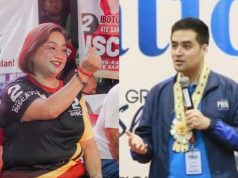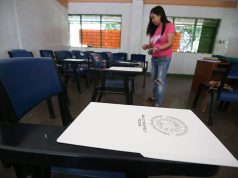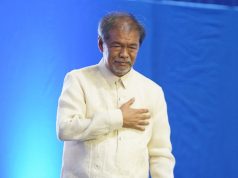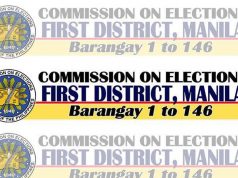
Filipinos called the attention of the Commission on Elections after the background of Tarlac’s Bamban Mayor Alice Guo was brought to light in a Senate joint committee hearing.
Opposition Sen. Risa Hontiveros raised the alarm over the “dubious” legal status of the neophyte mayor who was allegedly linked with raided Philippine Offshore Gaming Operation (POGO) firms located in her town.
Guo was questioned by Hontiveros and Sen. Win Gatchalian — who has been calling for the ban of POGOs — about her purported links to Zun Yuan Technology Incorporated and Hong Sheng Gaming Technology Incorporated.
Hong Sheng was raided in February 2023, while Zun Yuan was raided in March 2024.
Guo denied any affiliation with POGOs but she said that she used to be an incorporator of Baofu Corporation, a company that owns the compound that houses the raided POGOs. She added that she divested her shares upon entering politics.
“I am not in POGO. I am not involved in POGO,” she said in the Senate hearing.
“As an incorporator of Baofu, I assisted them in obtaining a letter of no objection from the previous administration,” Guo added.
Hontiveros, meanwhile, believed that the mayor “lied” during the hearing.
“The very stark and shocking example was the fact that she denied having a connection with Hong Sheng when it was already indicated in the document from the municipal government that she is the current head,” she told reporters on Wednesday.
Guo’s background was also scrutinized when she claimed to have been homeschooled from elementary to high school. However, the mayor could not recall the name of the institution that provided her education. She also said she did not go to college.
Moreover, her birth was only registered when she was already 17 years old. The mayor said this was because she was born inside their house.
“It catches one’s attention, especially because based on our research, there is a similar modus operandi wherein foreigners enter into certain countries. Eventually, they pretend to be locals and then do various tasks — some of which are not desirable,” Hontiveros said.
According to Guo, she was raised on a farm with just her father. Their family is said to be in the hog-raising business.
“Ang meron tayo ay ito: Certificate of live birth. Dito naman, Filipino ang nakalagay na nationality ng tatay niya, pero sa dokumento ng embroidery business, Chinese ang nationality na naka-record,” the senator stated.
“At sa kakatanong nga natin kahapon, inamin ni Mayor Alice na ‘Jian Zhong Guo’ pala ang totoong pangalan ng kanyang ama, at ‘yung Angelito Guo ay Filipino name lang daw,” Hontiveros added.
The senator also raised concerns from some Bamban residents who are claiming that the name “Alice Guo” just appeared during the 2022 national and local elections.
Filipinos of foreign descent who are registered voters can run for and hold local elective positions, but those with dual citizenship cannot.
“[Guo] was catapulted to power in a small town in Tarlac, but does she have the public records that will strongly establish her identity as a Filipino national?” Hontiveros said.
“Is it true that Guo may, in fact, be Chinese?” she added.
There were also some Filipinos who claimed that the surname Guo does not appear to be a common name for a “Chinoy” or a Filipino-Chinese in the country.
In this case reddit’s right cuz ive never met a chinoy named guo in my whole life like if they wanted to blend in they should have chosen a surname like tan, lim, co, or go 🤷♀️ https://t.co/tyYHz9IQTN
— 🍉Peerless Cucumber truther🍉 (@anghuangjun) May 9, 2024
“And if [you] go back further to older families, [you’re] gonna have surnames like Tantoco, Teehangkee, Ongpauco, etc which is a surname that’s composed of their ancestor’s entire *Hokkien* name, NOT Mandarin,” an X user claimed.
Mandarin is the official language of China, while Hokkien is a dialect of the Chinese language spoken mainly in Southern Fujian Province and Taiwan, as well as in Chinese communities in Southeast Asia.
“I graduated from a Fil-Chinese school and encountered a lot of possible Chinoy names. This is the first time I encountered ‘Guo,’ sounds mainland-ish. And there are hints of Mandarin in her accent,” another user commented.
Meanwhile, others called the Comelec’s attention after learning of the background of the first-term Bamban mayor, who is also the first female mayor in the town’s history.
“I don’t care if she’s Chinoy or naturalized. The issue is that she only got her birth certificate at 17 years old and [has] no records whatsoever, such as school records and whatnot. COMELEC needs to be investigated for allowing this too,” a user on X wrote.
“How can someone with murky identity, dubious birth registration, and non-existent school records even run get elected as mayor? Our process [of’ vetting candidates’ nationality is now put into question. Ano na po,@COMELEC? Dapat ito ay maalis sa pwesto kung hindi pala Pilipino,” another X user said.
“If her citizenship, personal and educational records are questionable, why on earth [was she] allowed to run and eventually won as Mayor? Ganyan na ba talaga ka t*nga ang Comelec at mga botante natin ngayon?” wrote a different Pinoy.
“And I thought the credibility and integrity of Comelec cannot fall MORE into shambles. How tf did this happen,” another online user reacted.
Comelec said that it has not received any petition to prevent Guo from running during the 2022 elections before. The latter ran as an independent candidate in Bamban.
“Walang power ang Comelec na mag-motu proprio disqualify ng isang kandidato, lalo pa pag pinag-uusapan ang ang issue ng citizenship, residency, registration bilang botante, edad. Kailangan merong magpa-file ng petition to cancel candidacy or disqualify the candidate,” Comelec Chairman George Garcia said.
According to the Local Government Code, an elective local official must be a citizen of the Philippines, a registered voter in the barangay, municipality, city or province where they intend to be elected and a resident there for at least one year immediately preceding the day of the election.
The candidate must also be able to read and write Filipino or any other local language or dialect.
They will be disqualified if they hold dual citizenship or are permanent residents of a foreign country, among others.









